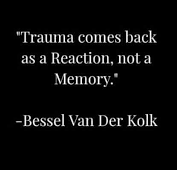Trauma is the lasting emotional response that results from living through distressing and life-threatening events.
“The first goal of trauma recovery should and must be to improve your quality of life on a daily basis.” Babette Rothschild
Is past trauma getting in the way of you living a fuller life? If yes, trauma-informed therapy can help.

Trauma-informed therapy asks “What happened to you?” instead of “What is wrong with you?”
It can help:
– understand your past trauma and how it affects you in the present
– discover ways in which you can live a more balanced, peaceful and fulfilling life.
Read more about Acute Trauma and PTSD and Developmental Trauma Therapy.
Acute Trauma and Post Traumatic Stress
Acute trauma can result from you suffering or witnessing a traumatic event. For example an assault, a car crash, or a natural disaster.

Is this you?
Have you suffered or witnessed a traumatic event, recently or several years ago?
Are you experiencing flashbacks, panic attacks, nightmares or intrusive memories?
Do these “pop up” when you least want or expect them?
Is your quality of life being affected by it?
If so, you may be suffering from post traumatic stress caused by the traumatic event.

We remember non-traumatic events like a story from the past.
Think of a time when you went on a train journey and nothing frightening happened. The memory of the journey is like a story with a date-stamp: what day it was, where you were going, why, whether it was nice or not, and so on.
If you get on the train again tomorrow, you will know this is a new journey. The old journey stays in the past.
This is because we remember non-traumatic events like stories with a start and an end, a bit like a folder labelled : My train journey from last Friday. You can pull the folder out if you want to, look through it, and put it back.

Traumatic events memories can feel like emotions and body sensations happening now.
What happens if, during your journey, the train derails, you are injured or see others being injured, and you fear for your life?
Having survived extreme danger, your brain and body decide to hold on to fragments of the event so they can use them as protective reminders in the future. These fragments can be what you saw, smelt, or heard during the trauma. They become triggers for the same emotions and sensations you felt during the accident.
So when, a few weeks later, you decide to get on a train again and see the inside of the carriage, you suddenly panic, feel frightened, and start running away or you freeze like a deer in the headlights.
It feels like you are re-living the accident and acting on survival instinct.
These symptoms are in fact valiant efforts by your brain and body to protect you because, in the moment, nobody told them that the danger is in the past.

What can help reduce the symptoms of post traumatic stress?
The Rewind Technique has been proven to be an effective therapy for stopping or greatly reducing symptoms of post traumatic stress.
After Rewind, the trauma event becomes a past memory instead of feeling like it is happening again in the present. You can read some objective appraisals of Rewind at PTSD UK.
Commonly reported benefits include:
– no more unwanted memories, nightmares or flashbacks
– ability to speak about the trauma without feeling overly anxious
– increased confidence
– more positive mood
– no more fear
I am a certified Rewind practitioner, having trained with the International Association for Rewind Trauma Therapy and within the NHS.
You can find out more about Rewind and what I offer here.

- Minimum 2 sessions, 2 weeks apart
- Each session lasts 50 minutes
- Total cost: £120 for two sessions, payable in advance
- Therapy can be in person at one of two locations or online
Developmental Trauma Therapy
Developmental trauma comes from trauma experienced repeatedly and over a long period of time during childhood and early life.

Is this you?
Do you carry deep-seated beliefs such as: I am unlovable; people are not to be trusted; I don’t matter; the world is dangerous, to name just a few?
Do you experience anger, avoidance, resignation, self-blame, shame or anxiety in your daily life without fully understanding why?
If yes, developmental trauma may be at the root of your problems today.

What is your story?
Developmental trauma can form deep-seated beliefs and responses that continue to be triggered in your present life.
Such responses, often sub-conscious, can influence your life in a negative way deep into adulthood.
Trauma memories often come up as feelings, emotions and body sensations.
You might have only a very fragmented narrative of what happened or no clear story at all.
Because trauma is remembered emotionally and somatically more than it is remembered in a narrative form that can be expressed verbally, you can often feel confused, overwhelmed, or crazy.
Without a memory in words or pictures, you do not recognize that what you are feeling is a memory.
Not understanding the origins and effects of early trauma can mean that you blame yourself and often experience anger, self-loathing and shame.

Causes of developmental trauma include:
– childhood physical or emotional neglect
– abuse
– abandonment
– living with alcoholic or substance- addicted caregivers
– living in a high conflict, unpredictable and unsafe environment
– narcissistic abuse
– domestic violence in the home

Developmental trauma can lead to:
– Chronic hypervigilance, stress and anxiety
– Anger and impulse control problems
– Addictions
– Relationship Difficulties
– Family Problems
– Attachment Problems
– Complex grief
– Low self-esteem

How can I help you?
I offer long-term, open-ended therapy for developmental trauma.
The therapy will be customised to your needs and can include the following approaches :
- Psychoeducation and stabilisation skills
- Mindfulness
- Somatic- awareness
- Attachment – focused
- Internal Family Systems
- Creative therapy
- Self-compassion
How to get in touch
To find out more or to book, please email me at ioana@alevacounselling.co.uk .
Alternatively, text me at 07392 617 911. I am unable to take calls.
I aim to respond to all enquiries within 24 hours.

Trauma Therapy
- Suggested 24 weekly or fortnightly sessions
- Option to review every 6-8 sessions
- Each session lasts 50 minutes
- Cost per session: £50 payable in advance
- Therapy can be in person at one of two locations or online